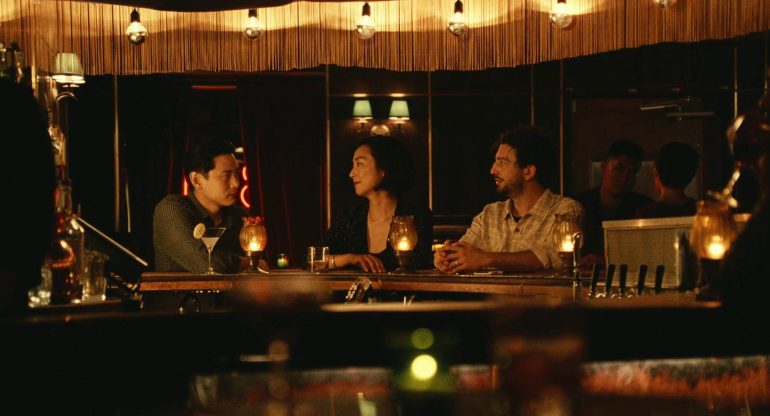A neon lit bar in New York City is filled with an idle mumble. A man and woman of Asian descent talk rather deeply, and a White man sits next to the woman, listening, chiming in occasionally, but appears on the periphery. An offscreen voice chuckles and jokes with another as they look on at this seemingly awkward scene from a distance, “Who do you think they are to each other?”
That is one of the many questions Celine Song’s directorial debut “Past Lives” asks. The film tells the story of Na Young (Greta Lee) and Hae Sung (Teo Yoo), two childhood friends from Korea who were separated when Nora’s parents emigrated to America. The two friends slowly re-enter and exit each other’s lives again and again through time as we experience their growing up in different worlds and how it affects them. Each time the two reunite, they feel like two pieces of a different puzzle that long to be together, but cannot. At least, not in this life…
“Past Lives” is Celine Song’s written and directorial debut, yet it shines with a level of filmmaking craft that seems that of an expert. Song has spoken about the truth of the film’s story, telling BAFTA about how she was at a bar in New York City with her husband and one of her childhood friends from Korea who had come to visit her, and realized “I was also translating between two different parts of myself” when speaking between the two of them. This inspired her to explore that experience of past and present self reflection through film.
Nora is played by Greta Lee, and gives an incredibly grounded yet vulnerable performance as a Korean playwright living in New York City who’s wrestling with what it means to feel at home and to reconcile with the finality of decisions that may be out of our hands. Hae Sung is played by Teo Yoo, who is able to bring a deep loneliness and longing to Hae Sung with the minimal amount of lines that he has and his masterful body language and facial acting, especially his eyes. Nora’s husband, Arthur, is played by John Magaro, another writer that Nora met during a writing retreat 12 years after leaving Korea for America, and his part in the film is incredibly important too, but you’ll have to see why when you view the film for yourself.
In “Past Lives”, the concept of In-Yun, which means providence, or fate in Korean, is explained to Arthur by Nora when they meet on a writing retreat in Montauk, New York: “It’s an In-Yun if two strangers even walk by each other in the street and their clothes accidentally brush. Because it means there must have been something between them in their past lives. If two people get married, they say it’s because there have been 8,000 layers of In-Yun over 8,000 lifetimes”. This is a rather painful concept to explore but one that’s ever so human. I thought about this after watching the film for quite some time; there may be people we deeply love, but our In-Yun may not be deep enough for them in this life, and we may meet them in the next, or perhaps this life is filled with enough In-Yun for a person we may have not be expecting… There’s no way to know.
On a technically superb scale, the film is shot on 35mm by cinematographer Shabier Kirchner, with brilliant symmetry and scenes blocked almost like a play—which may reflect Song’s play adaptation of Chekov’s “The Seagull” through the video game “The Sims 4” streamed on Twitch in November 2020—as well as locked down non moving shots of Korean architecture or images that are supposed to stand in for Nora and Hae Sung. A particular choice throughout the film that I found meaningful are these beautifully lit shots of warm, orange sunlight, either casted upon Nora’s face, or in the background of a scene. This to me ties back into the very concept of In-Yun; that fate perhaps shines on these characters throughout the film, moving them forward, giving them clarity, giving them answers to just who they belong with, even when it’s not who they expect.
As of the date of writing of this article, “Past Lives” has won 73 awards and been nominated for 212. When talking about what she wants people to take from this film, Song said she wants the audience to see it “as they are” as the film brings such individual and personalized feelings to the forefront of a participating audience member that Song feels (much like I do) the film will be felt entirely differently based on where you are in this life. I loved this film and how it made me feel. I will continue to ponder its meaning time and time again as I move through my own life and what In-Yun means to me.
“Past Lives” is available now on streaming and VOD.





